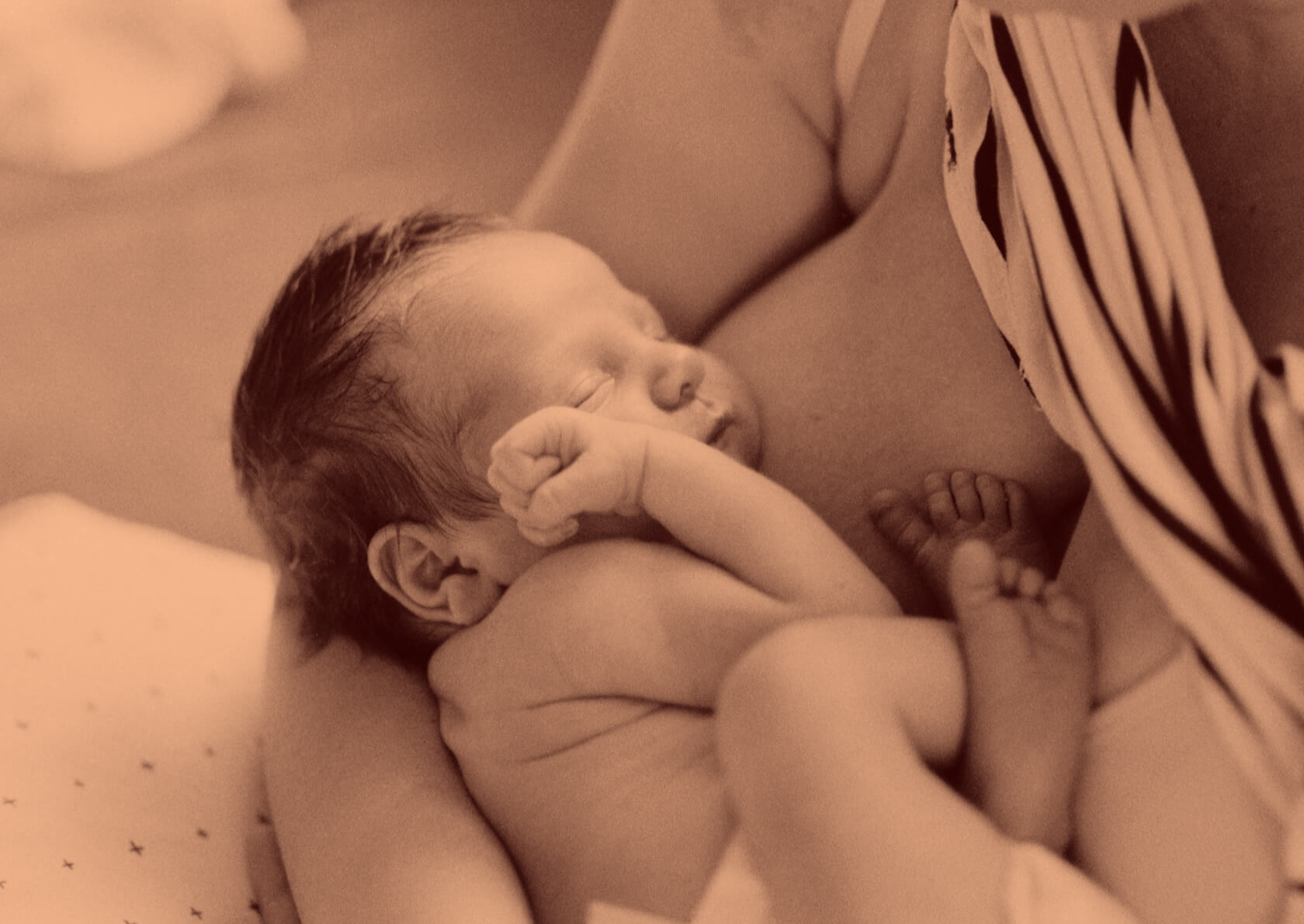Scrolling through social media, it’s easy to think that the postpartum period after birth is purely a loved-up, serene bonding time with your new baby. But while this is certainly a beautiful time, there’s also a whole lot more going on behind the scenes and certain challenges (including your state of mind and physical recovery) may present themselves to you and your partner, and these often aren’t shared enough. Remember, postpartum blues are NORMAL and your experience may be very different to someone else's.

We spoke with Monique Maitland about what every mama should know about postpartum. Monique is a midwife, nurse, host of the Middee podcast and founder of online pre- and post-natal community The Middee Society. She tells us what new mamas can really expect to be going on with their minds and bodies in the weeks after giving birth and how every mama’s postpartum is unique – and that’s okay.
Normalising postpartum
“Postpartum is one of the most challenging yet rewarding times of your life,” Monique says. In the period after giving birth, you can experience a kaleidoscope of emotions in a single day – complete joy, happiness, and excitement, but also overwhelm, exhaustion and even resentment that your ‘old’ life has seemingly come to an end.
Monique explains that social media can glorify postpartum and lead to new parents having unrealistic expectations for life with a new baby. “Let’s get one thing straight – it’s not as glamorous as Instagram makes it out to be,” she says. The reality is that postpartum does not fit a particular mould. Every mama’s postpartum will be different – and that’s okay! What’s important, Monique says, is to normalise the range of experiences that can occur during the postpartum period.
The early days
The first few weeks postpartum are real and raw. You’re recovering from giving birth, and that will be a different experience for every mama. Some mamas might have had a straightforward vaginal delivery, while others have had an instrumental delivery with an episiotomy or a planned or unplanned caesarean. No matter your mode of birth, the changes your body has been through are huge, and it takes time to recover.
You’ll be processing the birth emotionally, too. “So much happens in such a short period [when you give birth], so it’s normal to think, “What has just happened? What have I just gone through?” Monique explains. Many mamas have an expectation of what their birth will look like, and it can be challenging to come to terms with if the reality deviates from those hopes. At the same time, you’ll likely be feeling amazed and proud of what your body did to create your beautiful baby and how incredible and strong it was to give birth to them.

What physical changes can new mamas expect in the postpartum period?
There are so many completely normal physical changes that take place after you’ve given birth. The problem, Monique says, is that they aren’t spoken about often enough, so they can take women by surprise.
She says physical changes mamas might experience in the postpartum period include:
- Period-like bleeding for up to six weeks. “You need to embrace those maternity pull-ups and pads.”
- Discomfort from your wounds. Whether you’ve had a vaginal tear, an episiotomy, or a surgical wound from a caesarean, you’ll need to learn to care for your wounds and navigate any pain they cause you.
- Swelling. “Some body parts are going to feel so much more swollen than they have ever been in your life.” Your feet might be swollen as your body tries to rid itself of fluid. Mamas whose labour was induced might notice extra swelling as their bodies process the fluids given to them during induction. Giving birth can cause swelling to the perineum, so it’s important to stay on top of that with ice and pain relief. You might also have haemorrhoids. Gulp!
- Using the toilet. “Going to the bathroom can be daunting, especially for your first poo, but let me reassure you now; it is not as bad as you think.” For some women, passing urine after birth comes with some discomfort, while others experience incontinence. While incontinence after childbirth isn’t normal, it isn’t uncommon and is often temporary. If you experience it, you’re not alone. Seek help from your healthcare professional.
- Listen to your body. “If you feel something isn't quite right with how things are healing, get an opinion, get a second opinion. That's one important thing I have learned from my practice as a midwife - the mum always knows best.”
What about my breasts?!
In the early days after you’ve given birth, your breasts are likely to feel full, engorged and uncomfortable. But, Monique says, that’s normal. “These are all normal changes that happen to our breasts when our milk comes in. We create an oversupply to begin with until our baby regulates our supply. Breastfeeding works on supply and demand. So, depending on how often your baby's feeding, that will tell your brain how much milk to produce. But until your baby settles, it’s normal to have an oversupply and full breasts. Your breasts go rock hard, and your nipples may feel like they're just hanging on by a thread, but I promise you it will get easier.”
Monique says that when your breasts are full and engorged, there are ways to make breastfeeding a little easier. “Lactamo is a great tool for that because warming the Lactamo ball up at the start and massaging your breast to try to get the milk flowing can make it a little bit easier for your baby to start to drain the breast. But also, in contrast, if your breasts are still feeling quite tender after the feed, by cooling the Lactamo, you've got that soothing feeling.”
Lactamo is also helpful for mamas who are worried about low milk supply but feel touched out. “The more you stimulate your breast [with massage], the more messages that get sent to your brain to produce those hormones responsible for milk production. That's where Lactamo is so great because we're all sick of the hands touching us. We don't want the fingers of midwives and other random people touching us. How great to have such a wonderful mother-friendly product to just place on your breast, even whilst your baby's feeding, and give yourself a really soothing massage.”
Monique says learning to breastfeed can be one of the most challenging aspects of the postpartum period. It’s important to remember that, like learning to ride a bike, learning to breastfeed takes time and practice. You and your baby will learn how to do it together.
Riding the emotional rollercoaster of postpartum
It’s not just physical changes that we experience postpartum. Monique says it’s normal for new mamas to ride an emotional rollercoaster, with good days, bad days and every kind of day in between.
- The ‘baby blues’ are real. It hasn’t yet been uncovered why the baby blues occur, but it’s believed to be linked to all the postpartum changes to a new mama’s hormones. For the first five days after birth, it’s normal to find yourself crying happy and sad tears within a couple of hours of each other. Be kind to yourself while you ride it out. If you’re struggling with your feelings over a sustained period, you might be experiencing postpartum depression or anxiety. Reach out to your GP or a hotline like PANDA for help.
- Surrender to the tough days. Some days in the postpartum period will be more challenging than others, and that’s okay. You’re not the only one having a difficult day – so many other parents are experiencing exactly the same thing. And with all the tough days come good days, too. Remember, the blue skies will come. Helpful tip: Adopt a ‘Take it day-by-day’ mentality, and don’t place too high expectations on yourself to achieve things at the speed you once were able to.
- Prioritise your sleep. It may not be as simple as sleeping when the baby sleeps, but any extra sleep you can get will make a difference to how you feel. You might need to ask for (or surrender to) help so you can take a nap. You might need to say no to visitors. Whether it’s 20 minutes or an hour, everything looks different after sleep. The dishes and washing can wait, your mental health and ability to function peacefully is much more important.
- Make time for yourself. Although many mamas do, you don’t need to feel guilty for wanting an hour to yourself. Having a baby takes a physical and emotional toll, so looking after yourself and prioritising your own needs is important too. Asking for help doesn’t make you a failure – it’s helping you and helping your baby, and that's what’s most important. Helpful tip: Set small goals for yourself with realistic timeframes if you are someone who likes to feel purposeful and have a sense of achievement. Communicate clearly to your partner or family the simple things you feel you need to do for yourself. Take that solo walk, grocery shop child free, get your hair refreshed, a candle lit bath. Whatever it is, do it for you mumma, you deserve it and will feel so much better for it.
- You do you. Having a baby comes with lots of advice, whether you want it or not. It’s important to remember that what works for someone else may not work for you, and vice versa, and that is completely fine. You are not obliged to do something the way someone else tells you to do it. You do what works for you.
If in doubt, please don’t hesitate to contact your healthcare professional.






